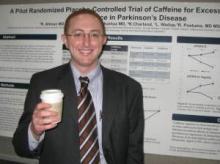The multinational, double-blind study was designed to assess whether caffeine might help patients with Parkinson’s counteract excessive daytime sleepiness, an often debilitating symptom that affects an estimated 25%-50% of people with the disease. Treatments are limited. Surprisingly, caffeine hadn’t been studied before in Parkinson’s disease to treat excessive somnolence, despite being used for centuries as a psychostimulant, Dr. Robert Altman said in a poster discussion at the annual meeting of the American Academy of Neurology.
Sixteen patients with Parkinson’s disease and excessive daytime somnolence who were ingesting less than 200 mg/day of caffeine were randomized to take capsules containing 100 mg of caffeine or placebo twice a day for 3 weeks, then the dose was increased to 200 mg twice a day for another 3 weeks. That’s the equivalent of two to three cups of coffee per day, depending on the size, but without that delicious coffee aroma. Just sayin’.
One patient in the placebo group dropped out before finishing the 6-week study, complaining of motor worsening. Prescient, perhaps, because the study found only a mild and statistically insignificant improvement in somnolence in the caffeine group, compared with placebo (measured by the Epworth Sleepiness Scale, or ESS), but found significant improvements in the “motor state” of patients in the caffeine group, Dr. Altman and his associates reported.
Here’s what motor state means: The caffeinated patients showed improvement in the overall quality of their gait, less rigidity in gait, and a mean decrease of 4.5 points on the Unified Parkinson Disease Rating Scale (UPDRS), compared with a 2.1-point increase on the UPDRS in the non-caffeinated group, a significant difference. ESS scores for sleepiness improved in both groups, modestly (but not significantly) more in the caffeine group than on placebo, with decreases of 4.4 points and 2.8 points, respectively.
Caffeine is a nonspecific adenosine-A2A antagonist. Researchers on the hunt for new Parkinson’s treatments have theorized that A2A receptor mechanisms may contribute to Parkinson’s symptoms and that selectively blocking the receptor might reduce symptoms.
The ongoing study expects to enroll 42 patients. With caffeine’s well-understood safety profile and relatively low cost, these early results suggest that caffeine has “considerable promise” as a therapeutic agent in Parkinson’s disease, Dr. Altman said. It seems to provide motor benefits and might or might not give a wee bit of pick-me-up to sleepy patients. “If they also get more awake from it, all the better,” said Dr. Altman, a fourth-year neurology resident at McGill University, Montreal.
He admits to being a one- to two-cups-per-day coffee drinker himself but said he has no other conflicts of interest. One of his associates in the study declared relationships with Abbott, Allon Therapeutics, Astra Zenica, Biovail, Boerhinger-Ingelheim, Cephalon, Eisai, Medtronic, Lundbeck A/S, Novartis, Merck Serono, Solvay, and Teva.
–Sherry Boschert (on Twitter @sherryboschert)

